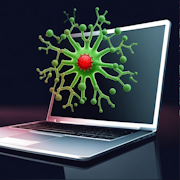Stay safe online
Simple steps to protect your online presence

Why is using the web risky?
Because the aim of unscrupulous criminals is to get money with as little effort as possible; they dont need to break into your house and steal your property, then have the hassle of selling it if they can just get the money from you directly. They dont need to sell you drugs or stolen property if they can get money for nothing, with very little risk.
How can they do that?
One way is to mislead you into giving them money, or access to your bank details. However there are also ways they can get money from others by providing information about you, or even just getting you to visit a page. On other pages I'll talk about other hazards - links, downloads and "helper programs" and hazards in email.
DO PLEASE TAKE TIME TO READ THOSE PAGES
What are the risks?

Perhaps the main risk is that you will - inadvertently - give a criminal free access to your computer and passwords. Imagine what they could do!
But that is exactly what a scam can lead to. Read about the "remote access" scam on this page.
Another serious risk - more than a virus attack - is "social engineering".
Criminals have written programs (spiders) that gather information about you. They can sell it and the more information thay have about you the more easily they can trap you into making a potentially expensive mistake. Its called "phishing".
A LOT of your personal information is already in the public domain, or easily accessed. Statutory records hold your name, address, previous addresses, date of birth, parents names, telephone number, NI number, driving licence details, etc.
For example see this site: https://www.ukphonebook.com/find-a-person
If someone has a little information about you it can make a scam MUCH more credible.
"My computer has good defences - I should not need to worry."
Windows 11 has very good security out of the box. It provides several lines of defence against infections: Windows firewall, Windows Defender, and User Access Control. If you have an earlier version you shgould have a third party anti-virus, and there are several good ones that are free. I recommend AVG free edition. However its too easy to become reliant on your anti-virus, and believe your pc is safe from malware.

No anti-virus software will give 100% protection against YOUR mistakes.
In fact some malware can turn off or even uninstall your anti-virus, but make it look as if its still working. The ONLY way to stay safe from malware is to be aware of the risks and use safe practices when connected to the internet.
But viruses are not the most serious concern!
Its MUCH more likely that you may be tricked by a "scam" into giving away information that can end up costing you a LOT of money.